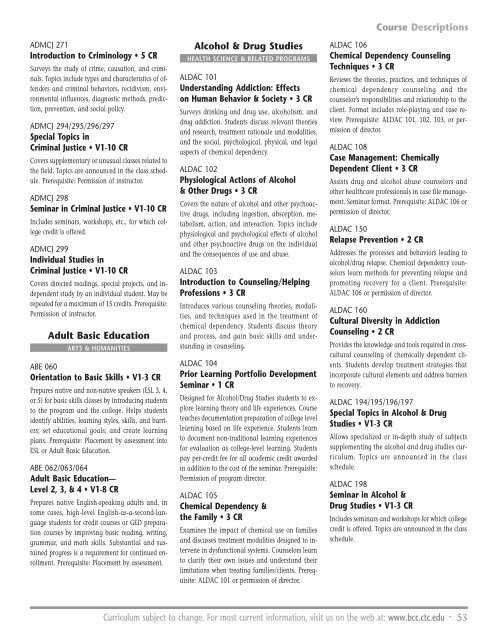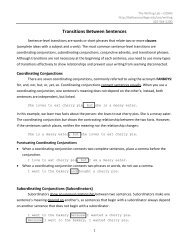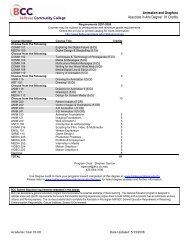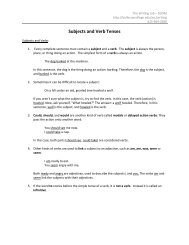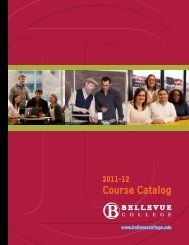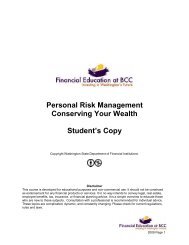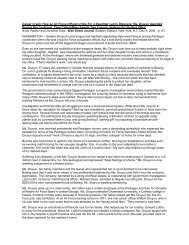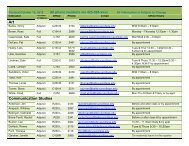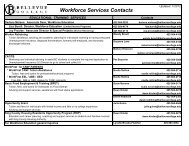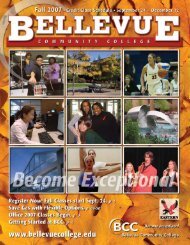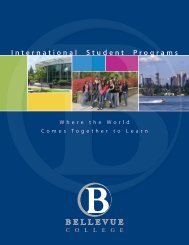2003 / 2004 - Bellevue College
2003 / 2004 - Bellevue College
2003 / 2004 - Bellevue College
You also want an ePaper? Increase the reach of your titles
YUMPU automatically turns print PDFs into web optimized ePapers that Google loves.
ADMCJ 271<br />
Introduction to Criminology • 5 CR<br />
Surveys the study of crime, causation, and criminals.<br />
Topics include types and characteristics of offenders<br />
and criminal behaviors, recidivism, environmental<br />
influences, diagnostic methods, prediction,<br />
prevention, and social policy.<br />
ADMCJ 294/295/296/297<br />
Special Topics in<br />
Criminal Justice • V1-10 CR<br />
Covers supplementary or unusual classes related to<br />
the field. Topics are announced in the class schedule.<br />
Prerequisite: Permission of instructor.<br />
ADMCJ 298<br />
Seminar in Criminal Justice • V1-10 CR<br />
Includes seminars, workshops, etc., for which college<br />
credit is offered.<br />
ADMCJ 299<br />
Individual Studies in<br />
Criminal Justice • V1-10 CR<br />
Covers directed readings, special projects, and independent<br />
study by an individual student. May be<br />
repeated for a maximum of 15 credits. Prerequisite:<br />
Permission of instructor.<br />
Adult Basic Education<br />
ARTS & HUMANITIES<br />
ABE 060<br />
Orientation to Basic Skills • V1-3 CR<br />
Prepares native and non-native speakers (ESL 3, 4,<br />
or 5) for basic skills classes by introducing students<br />
to the program and the college. Helps students<br />
identify abilities, learning styles, skills, and barriers;<br />
set educational goals; and create learning<br />
plans. Prerequisite: Placement by assessment into<br />
ESL or Adult Basic Education.<br />
ABE 062/063/064<br />
Adult Basic Education—<br />
Level 2, 3, & 4 • V1-8 CR<br />
Prepares native English-speaking adults and, in<br />
some cases, high-level English-as-a-second-language<br />
students for credit courses or GED preparation<br />
courses by improving basic reading, writing,<br />
grammar, and math skills. Substantial and sustained<br />
progress is a requirement for continued enrollment.<br />
Prerequisite: Placement by assessment.<br />
Alcohol & Drug Studies<br />
HEALTH SCIENCE & RELATED PROGRAMS<br />
ALDAC 101<br />
Understanding Addiction: Effects<br />
on Human Behavior & Society • 3 CR<br />
Surveys drinking and drug use, alcoholism, and<br />
drug addiction. Students discuss relevant theories<br />
and research, treatment rationale and modalities,<br />
and the social, psychological, physical, and legal<br />
aspects of chemical dependency.<br />
ALDAC 102<br />
Physiological Actions of Alcohol<br />
& Other Drugs • 3 CR<br />
Covers the nature of alcohol and other psychoactive<br />
drugs, including ingestion, absorption, metabolism,<br />
action, and interaction. Topics include<br />
physiological and psychological effects of alcohol<br />
and other psychoactive drugs on the individual<br />
and the consequences of use and abuse.<br />
ALDAC 103<br />
Introduction to Counseling/Helping<br />
Professions • 3 CR<br />
Introduces various counseling theories, modalities,<br />
and techniques used in the treatment of<br />
chemical dependency. Students discuss theory<br />
and process, and gain basic skills and understanding<br />
in counseling.<br />
ALDAC 104<br />
Prior Learning Portfolio Development<br />
Seminar • 1 CR<br />
Designed for Alcohol/Drug Studies students to explore<br />
learning theory and life experiences. Course<br />
teaches documentation preparation of college level<br />
learning based on life experience. Students learn<br />
to document non-traditional learning experiences<br />
for evaluation as college-level learning. Students<br />
pay per-credit fee for all academic credit awarded<br />
in addition to the cost of the seminar. Prerequisite:<br />
Permission of program director.<br />
ALDAC 105<br />
Chemical Dependency &<br />
the Family • 3 CR<br />
Examines the impact of chemical use on families<br />
and discusses treatment modalities designed to intervene<br />
in dysfunctional systems. Counselors learn<br />
to clarify their own issues and understand their<br />
limitations when treating families/clients. Prerequisite:<br />
ALDAC 101 or permission of director.<br />
ALDAC 106<br />
Chemical Dependency Counseling<br />
Techniques • 3 CR<br />
Reviews the theories, practices, and techniques of<br />
chemical dependency counseling and the<br />
counselor’s responsibilities and relationship to the<br />
client. Format includes role-playing and case review.<br />
Prerequisite: ALDAC 101, 102, 103, or permission<br />
of director.<br />
ALDAC 108<br />
Case Management: Chemically<br />
Dependent Client • 3 CR<br />
Assists drug and alcohol abuse counselors and<br />
other healthcare professionals in case file management.<br />
Seminar format. Prerequisite: ALDAC 106 or<br />
permission of director.<br />
ALDAC 150<br />
Relapse Prevention • 2 CR<br />
Addresses the processes and behaviors leading to<br />
alcohol/drug relapse. Chemical dependency counselors<br />
learn methods for preventing relapse and<br />
promoting recovery for a client. Prerequisite:<br />
ALDAC 106 or permission of director.<br />
ALDAC 160<br />
Cultural Diversity in Addiction<br />
Counseling • 2 CR<br />
Provides the knowledge and tools required in crosscultural<br />
counseling of chemically dependent clients.<br />
Students develop treatment strategies that<br />
incorporate cultural elements and address barriers<br />
to recovery.<br />
ALDAC 194/195/196/197<br />
Special Topics in Alcohol & Drug<br />
Studies • V1-3 CR<br />
Allows specialized or in-depth study of subjects<br />
supplementing the alcohol and drug studies curriculum.<br />
Topics are announced in the class<br />
schedule.<br />
ALDAC 198<br />
Seminar in Alcohol &<br />
Drug Studies • V1-3 CR<br />
Course Descriptions<br />
Includes seminars and workshops for which college<br />
credit is offered. Topics are announced in the class<br />
schedule.<br />
Curriculum subject to change. For most current information, visit us on the web at: www.bcc.ctc.edu • 53


